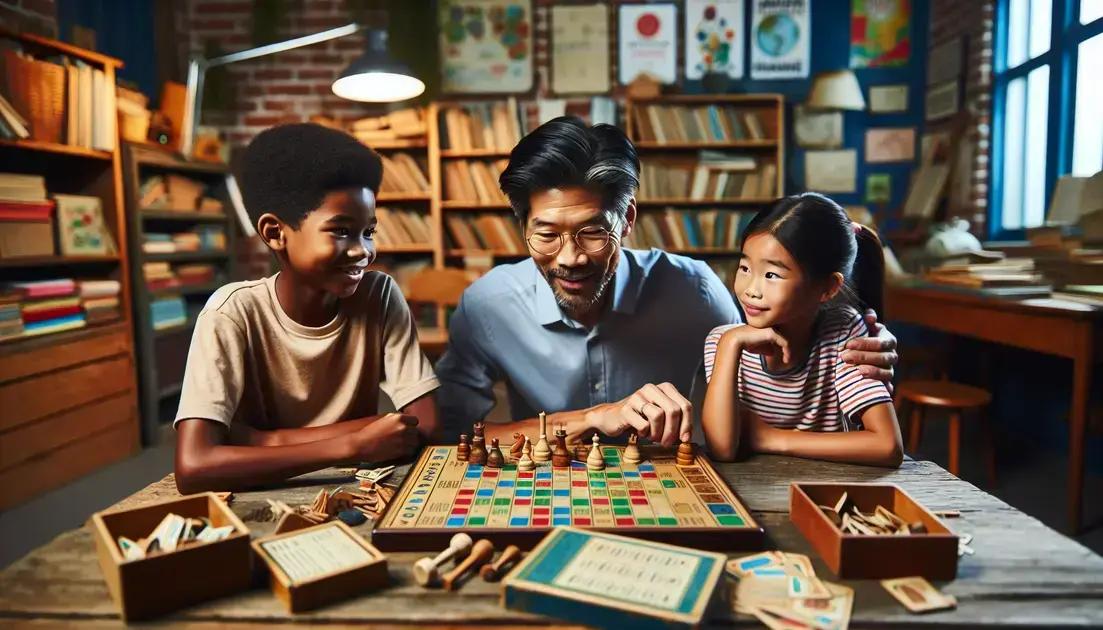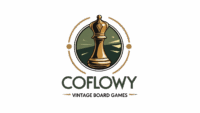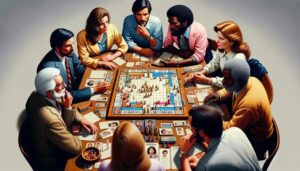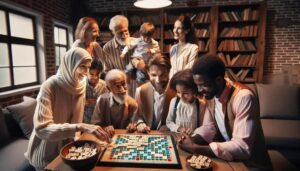Vintage board games homeschool activities enhance learning by combining fun, critical thinking, and subject reinforcement, making them effective tools for engaging and educational homeschool curriculums.
Vintage board games homeschool activities unlock a playful approach to learning that many families overlook. Ever wondered how a simple game could brighten up your homeschool day and teach more than just winning? Let’s explore this idea together.
why vintage board games fit well in homeschool curriculums
Vintage board games naturally complement homeschool curriculums by blending education and entertainment. These games offer hands-on learning experiences that boost critical thinking, problem-solving, and social skills.
Many vintage board games focus on core subjects such as math, geography, and vocabulary, making them practical tools to reinforce lessons outside textbooks. For example, games like Scrabble enhance spelling and vocabulary, while Monopoly teaches money management and strategic planning.
Engaging Multiple Learning Styles
Homeschoolers benefit because vintage board games appeal to various learning styles—visual, kinesthetic, and auditory. Children interact with physical game pieces, read instructions, and discuss strategies, which helps keep them involved and attentive.
Encouraging Family Interaction
These games create opportunities for family bonding and cooperative learning. Playing together encourages communication and teaches children how to follow rules and navigate social dynamics, valuable skills beyond academics.
Additionally, vintage board games often have simpler rules and nostalgic charm, making them less overwhelming for younger learners compared to modern complex games.
Overall, vintage board games make homeschool curriculums more dynamic and enjoyable, transforming learning into a rewarding, interactive, and social experience.
educational benefits of vintage board games for kids
Vintage board games offer numerous educational benefits that help children learn in a fun and interactive way. These games stimulate cognitive skills such as memory, attention, and strategic thinking.
Developing critical thinking and problem-solving
Many vintage board games challenge kids to plan moves ahead and consider different outcomes. This nurtures critical thinking and problem-solving skills, essential for academic success and daily decision-making.
Enhancing math and literacy skills
Games often require counting spaces, keeping score, or reading cards, which naturally reinforce math and literacy. For instance, games like Scrabble improve vocabulary, while dice games can boost addition and subtraction abilities.
Building social and emotional skills
Playing board games teaches children how to take turns, handle winning and losing gracefully, and communicate effectively. These social interactions support emotional intelligence and teamwork.
Overall, vintage board games serve as powerful educational tools that blend learning with play, making homeschool activities engaging and effective.
how to select the best vintage board games for learning
Choosing the best vintage board games for learning involves considering several key factors that align with your homeschool goals. First, look for games that focus on specific educational skills such as math, language, or critical thinking.
Assess the age and skill level
Make sure the game matches your child’s age and abilities. Games that are too complex may cause frustration, while overly simple games might not offer enough challenge. Check the recommended age on the game box and read reviews if possible.
Look for clear educational value
Some vintage games are designed with learning in mind. Examples include word-building games for literacy or strategy games that improve logical thinking. Pick games that reinforce what your child is currently studying or skills you want to develop.
Consider engagement and fun
Learning works best when children are motivated and interested. Choose games with appealing themes and interactive elements. Games that encourage player interaction help with social skills and keep the experience lively.
Finally, check the game components. Vintage games should have all pieces intact and in good condition. This ensures a smooth playing experience and reduces distractions.
By carefully selecting vintage board games with these factors in mind, you can enhance your homeschool curriculum with enjoyable and educational tools.
creative ways to integrate vintage games into daily lessons

Integrating vintage board games into daily lessons can make learning more dynamic and enjoyable. One creative method is to use games as icebreakers or warm-up activities that introduce new topics in a playful way.
Turn game mechanics into lesson themes
For example, use the strategy of a game like Chess to discuss planning and decision-making. Or adapt word games like Scrabble to practice spelling and vocabulary relevant to your lesson of the day.
Create subject-specific challenges
Modify vintage games by adding questions or tasks related to subjects such as history, science, or math. For instance, after each turn, children could answer a trivia question worth extra points, which reinforces lesson content.
Use games for group projects
Encourage collaboration by assigning group challenges using board games. This helps develop social skills while applying lessons on teamwork, communication, and problem-solving.
Scheduling regular game days helps build routine and motivation. Incorporating vintage board games this way encourages children to associate learning with fun and active engagement.
Overall, these creative approaches make daily homeschool lessons exciting, interactive, and more memorable by blending education and play.
tips to adapt games for different homeschool subjects
Adapting vintage board games for different homeschool subjects can make learning versatile and fun. Start by identifying core skills each game develops and match them to your curriculum goals.
Math adaptations
Use games involving counting or money, like Monopoly, to teach addition, subtraction, and basic budgeting. Add custom rules such as solving math problems before earning points to deepen understanding.
Language arts adaptations
Modify word games like Scrabble or Boggle to include spelling challenges or vocabulary building based on your current lessons. Encourage students to create sentences with drawn words to improve grammar.
Science adaptations
Incorporate trivia questions related to science topics between moves in any game. You can also assign categories like animals or planets to game pieces for quizzes during play.
History and geography adaptations
Use maps or location-based games, adding facts or questions about places, people, or events. This helps reinforce knowledge while keeping children engaged with interactive content.
Customizing game rules to fit subjects allows you to tailor each session to your teaching goals. This flexibility makes vintage board games powerful tools that blend education and active play across diverse topics.
encouraging critical thinking through board gameplay
Board games are excellent tools for encouraging critical thinking in homeschool settings. They require players to analyze situations, anticipate consequences, and make strategic decisions.
Applying logic and strategy
Games like chess or checkers demand logical moves and planning ahead. Children learn to evaluate options and predict opponents’ actions, strengthening their reasoning skills.
Problem-solving under pressure
Many vintage board games introduce challenges that must be overcome quickly. This builds the ability to think on one’s feet and solve problems efficiently during gameplay.
Encouraging reflection and decision-making
After each move, players must consider the outcome and adjust their tactics. This cycle of reflection and adaptation enhances decision-making abilities valuable in real-life situations.
Playing board games regularly creates a safe space for kids to practice thinking critically, testing hypotheses, and learning from mistakes without fear.
These experiences translate to stronger analytical skills that benefit students academically and personally.
stories of families using vintage games in homeschooling
Many homeschooling families have found vintage board games to be a valuable part of their educational routine. These games create moments of connection and learning beyond traditional lessons.
a family turning game night into learning time
The Johnsons use classic games like Scrabble and Monopoly every week to reinforce spelling and math skills. The kids enjoy friendly competition while parents guide discussions on strategy and vocabulary, making education feel natural and fun.
embracing creativity and teamwork
The Ramirez family adapts vintage games by adding personalized questions and challenges related to their current lessons. This keeps games fresh and integrates learning objectives seamlessly. They appreciate how these activities encourage communication and teamwork among siblings.
balancing screen time with hands-on fun
For the Smiths, vintage board games offer a welcome break from screens. Playing together creates a warm environment for sharing knowledge, problem-solving, and building patience. They report improved focus and enthusiasm for learning in their children.
These stories show how vintage board games enhance homeschool experiences by making learning interactive, social, and enjoyable.
Making vintage board games a part of homeschool learning
Vintage board games provide a unique way to make homeschooling more engaging and hands-on. They support critical thinking, social skills, and subject learning in a way that feels like play.
By selecting the right games and adapting them to your lessons, you can create memorable and effective learning experiences. Families who use these games often report improved focus, teamwork, and enthusiasm for learning.
Incorporating vintage board games into homeschool curriculums is not just about education—it’s about building connections, having fun, and inspiring a lifelong love of learning.




